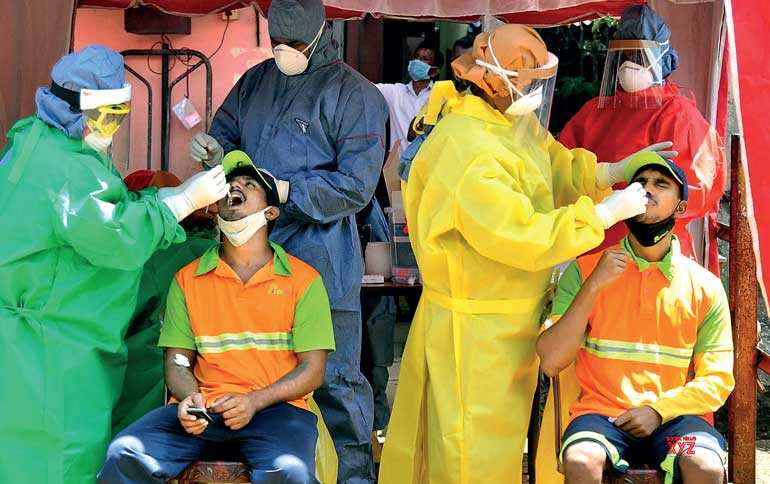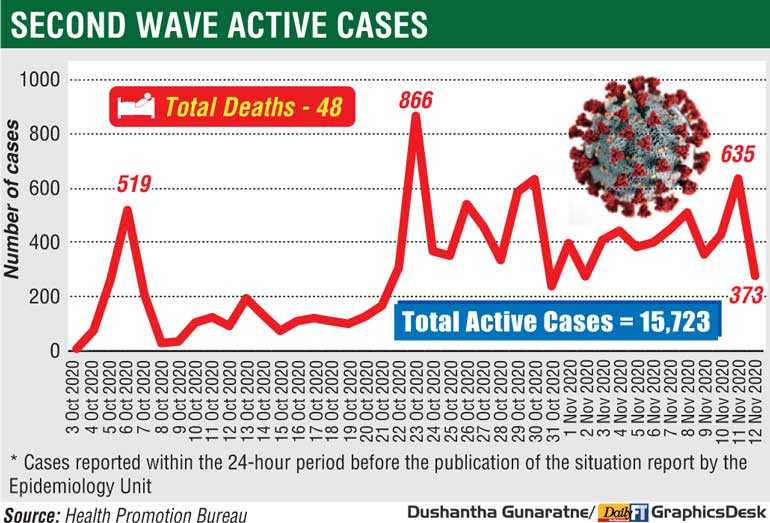Tuesday Feb 24, 2026
Tuesday Feb 24, 2026
Friday, 13 November 2020 00:30 - - {{hitsCtrl.values.hits}}

By Shailendree Wickrama Adittiya
The dual COVID-19 cluster that emerged from Divulapitiya and Peliyagoda has exceeded 12,000 cases, with 373 persons testing positive yesterday.
According to the Department of Government Information, of the patients identified yesterday four were arrivals from the UAE while 369 were associates of the Peliyagoda COVID-19 cluster, which has now expanded to 12,227 cases since it first emerged on 3 October.
The total number of confirmed cases in the island has thus risen to 15,723. This includes 1,477 Sri Lankan returnees from abroad, 950 Navy personnel and their contacts, 651 persons connected to the Kandakadu cluster, and 102 foreigners.
Of the confirmed cases, 5,022 persons are currently undergoing treatment at 52 dedicated centres. This includes 391 persons at the Neville Fernando Teaching Hospital, 339 persons at the Bingiriya Treatment Centre, and 308 persons at the Punani Treatment Centre.
Hospitals are also monitoring 428 persons suspected of having COVID-19.
The COVID-19 death count meanwhile rose to 48 yesterday after two individuals passed away at the Colombo East Base Hospital while receiving treatment.
According to health authorities, the deaths were a 54-year-old resident of Colombo 12 who died of chronic lung disease and a COVID-19 infection, and a 45-year-old resident of Meegoda who succumbed to COVID pneumonia and secondary bacterial infection.
Meanwhile, the total number of COVID-19 recoveries in the island rose to 10,653, with hospitals discharging 470 persons yesterday. This includes 66 persons from the Gallela Treatment Centre, 55 persons from the Punani Treatment Centre, and 42 persons from the Bingiriya Treatment Centre.
According to the National Operations Centre for the Prevention of the COVID-19 Outbreak (NOCPCO), two persons left quarantine centres yesterday, while 31 arrivals from Qatar, 25 arrivals from Pakistan, and 20 arrivals from Oman have been directed to quarantine centres.
The NOCPCO added that 2,690 persons are currently undergoing quarantine at 29 centres managed by the Sri Lanka Army, Sri Lanka Navy, and Sri Lanka Air Force.
Police Spokesperson DIG Ajith Rohana yesterday said 80,000 persons belonging to 29,206 families are currently undergoing home quarantine in various parts of the island. He added that 3,000 police officers are also undergoing quarantine at various centres, and that 53 police officers tested positive for COVID-19 during the 24-hour period ending last evening.
“All persons identified among officers were taken to quarantine centres ten days ago in the Western Province. So the sub-cluster is in the process of being inactive as all patients are identified from quarantine centres and not from police officers on duty. All steps have been taken to control this,” he said.
The Police Spokesperson went on to explain the movement restrictions placed on the Western Province until Sunday, clarifying that while individuals cannot leave the Western Province there are no restrictions on entering. However, he noted, if persons are entering the Western Province to obtain a service or for other duties, they must make arrangements to remain in the area until Sunday.
Police officers will be stationed at exit points, including expressways, to ensure people do not attempt to leave the Western Province, with roadblocks set up at the Benthara, Kochchikade, Alagala, and Giriulla bridges, as well as the Ingiriya and Avissawella borders.
Persons who do leave the Western Province will be required to undergo home-quarantine for 14 days, after which, legal action will be taken against them.
Regarding isolated areas in the Western Province, DIG Ajith Rohana said: “Persons in these areas must remain at home. If they are unwell and require treatment, they can go to the nearest hospital without any special approval or can call for an ambulance via 0113422558. Persons in other areas of the Western Province can travel within the Western Province with adherence to safety guidelines like wearing face masks and maintaining social distancing.”
He added that observations have been made of persons in isolated areas not adhering to movement restrictions, especially in the five housing schemes that are under lockdown. Due to this, a decision was made to use drones to monitor isolated areas in Colombo North, Colombo Central, and Gampaha.
The Police Spokesperson also asked persons celebrating Deepavali to refrain from organising festivities as a group, and to limit them to family members.
The Health Ministry yesterday issued guidelines for Hindu religious leaders and community on how to celebrate Deepavali amidst the COVID-19 pandemic, while ensuring there is no further spread of the virus.
According to the statement, festivities should not be organised at Kovils, in the community, or in estates. People should refrain from gathering and must instead celebrate from their homes, especially making sure to not spread the virus from high risk areas like the Western Province.
People should refrain from long trips and wish family and friends over the phone instead of in person. When wishing someone in person, the Health Ministry recommends greeting each other without shaking hands or hugging.
While persons must wash their hands with soap before and after religious rituals, the Health Ministry has warned against using highly flammable alcoholic hand sanitiser when lighting lamps.
In addition to this, the Health Promotion Bureau stated that 627,011 OCR tests have been carried out in the island to date, including 10,111 tests on Wednesday.
Meanwhile Health Ministry Media Spokesperson Dr. Jayaruwan Bandara yesterday noted that proper testing may reveal that the country’s case count is higher than the current count. “Within the Colombo municipal area, the chances are high of clusters emerging with no control of the spread of the virus.”
Meanwhile, Government Medical Officers’ Association (GMOA) Editor Dr. Haritha Aluthge said decisions should be made regarding high risk areas, which has shifted from Gampaha to the Colombo municipal area.
He went on to say that, previously, COVID-19 complications arose mostly among elderly persons, however there is now an increase in deaths among those aged between 40 and 50 years, especially as a result of heart attacks and other complications.
“When we analyse the COVID-19 deaths, it is apparent that a considerable number of those who die at home as well as the total deaths had non-communicable diseases. Controlling diabetes and other non-communicable diseases will help us control COVID-19.”

